In our daily life, we see many trees and plants around us every day. Beautiful and simple in appearance, these Ayurveda medicinal plants and their uses actually have many medicinal properties inside them. Today we tell you about 11 such plants, by using which we can avoid many diseases.
Importance of medicinal plants in Ayurveda
Medicinal plants hold paramount importance in Ayurveda, serving as the foundation of this ancient system of healing. They are revered for their natural therapeutic properties, which not only alleviate ailments but also promote overall well-being.
Ayurveda emphasizes a holistic approach to health, and medicinal plants play a central role in achieving this balance. They are used to prepare herbal remedies, oils, and formulations tailored to individual constitutions, addressing both physical and mental health.
Furthermore, these plants often possess minimal side effects, making them a preferred choice for holistic healing in harmony with nature. Ayurveda’s reliance on medicinal plants underscores its timeless relevance in promoting sustainable, natural healthcare practices.
Top Ayurveda medicinal plants and their uses in remedies
In Ayurveda holistic system of traditional medicine, several medicinal plants exists each renowned for its unique therapeutic properties and diverse range of uses in promoting health and well-being. Here are the top 10.
The Peepal Tree (Ficus religiosa)
The peepal tree is worshipped in India by the Hindus. For that matter, it is also called sacred fig. On the other side, The tree is also associated with many medicinal properties.
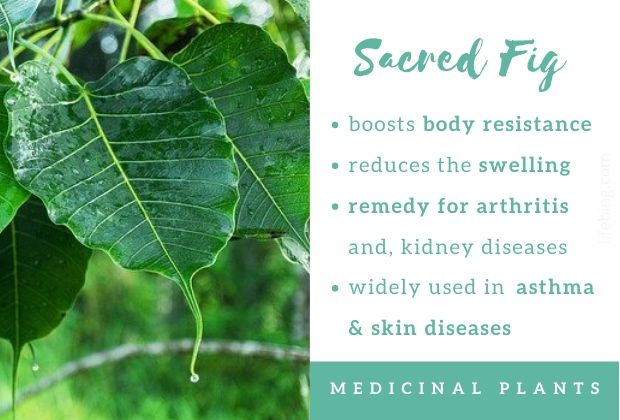
What are the medicinal benefits?
- Immunity: Consuming the leaves of peepal trees boiled with hot water delivers the body resistance to fight ailments.
- Controls Swelling: Consuming its leaves as tea daily can make the heart healthy and relieve the problem of inflammation in any part of the body.
- Uric Acid Remedy: A potion made from its bark not only relieves in joint pain, arthritis and, kidney diseases but also removes uric acid from the body.
Papaya
Papaya leaves are very beneficial for a healthy body.
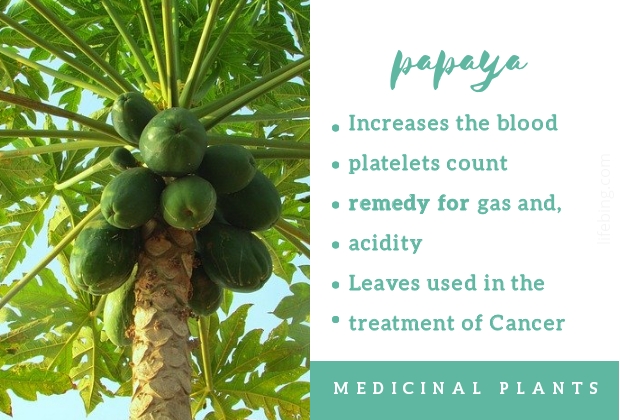
What are the medicinal benefits?
- Dengue: Consuming the juice made from papaya leaves prevent fatal diseases like dengue. In fact, papaya increases platelets – a typical symptom of dengue.
- Improves Digestion: Papaya contains a digestive enzyme named papain. The enzyme strengthens the digestive system and prevents gas and acidity.
- Cancer Remedy: The leaf extracts of papaya leaves have the ability to fight a serious disease like cancer. The cytotoxic nature of papaya is useful against cervix, breast, liver, lung and pancreatic cancers.
- Arthritis: Papaya is said to be beneficial in arthritis treatment by Ayurveda. It is said to reduce inflammation, soothe swelling and joint pain, and improve the mobility of the affected joints.
Arka Plant (Crown flower)
The plant of extracts is not less than any medicine. Many diseases are treated with this herb.
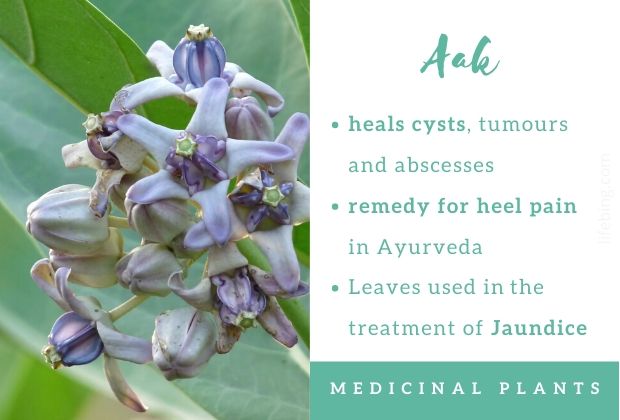
What are the medicinal benefits?
- Heals Wounds: Taking its root bark with 1 pinch of honey helps in quick recovery of any wounds along with tumours, cysts, abscesses.
- Heel Pain Remedy: Heating the leaves and tying it on the heels provides instant relief.
- Liver Disease Remedy: Jaundice patient gets relief by taking an extract of petals of extract flowers and keeping the rest of it in the pan.
Pomegranate
The pomegranate (Punica granatum) is a deciduous shrub with a height of up to 10 metres. It has bright red flowers and bears fruits. The shrub originated in the region extending from Iran to northern India and now common in the European markets.
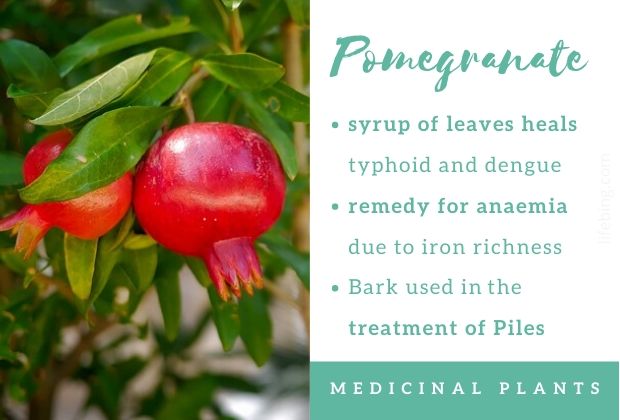
What are the medicinal benefits?
- Anemia Natural Cure: Pomegranate is a good source of iron when there is a lack of blood in the body.
- Piles Remedy: Its bark provides relief from piles.
- Skin Infection Cure: Applying juice of its leaves provides relief in itching, burning sensation in hands and feet.
- Typhoid Cure: Consuming syrup made from pomegranate leaves is beneficial for typhoid and dengue patients.
Punarnava (red spiderling)
The small plant Punarnava grows throughout India, the Pacific, and the southern United States. It has small flowers (around 5 mm) and bears a sticky small fruit.
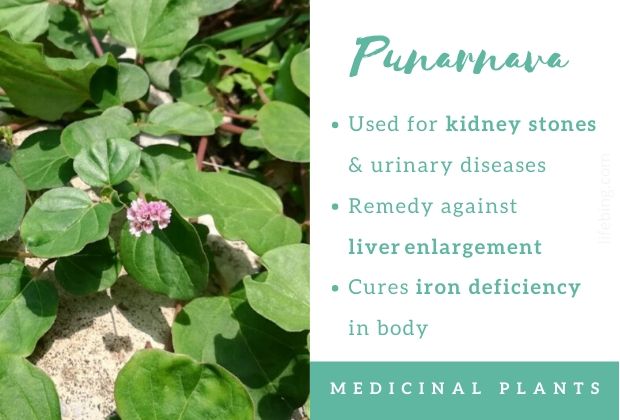
What are the medicinal benefits?
- Kidney Disease Cure: Drinking its powder or syrup is beneficial for kidney stones and other urinary diseases.
- Fatty Liver: The root extract of red spidering works as a liver tonic preventing liver enlargement.
- Iron Deficiency: It is very effective in removing anemia.
Kachnar (mountain ebony)
The mountain ebony (Kachnar) plant is very beautiful in appearance and widely used in Ayurveda. The flowers of Kachnar blooms for several months. It grows up to 40 feet in height with leaves resembling a cow’s hoof.
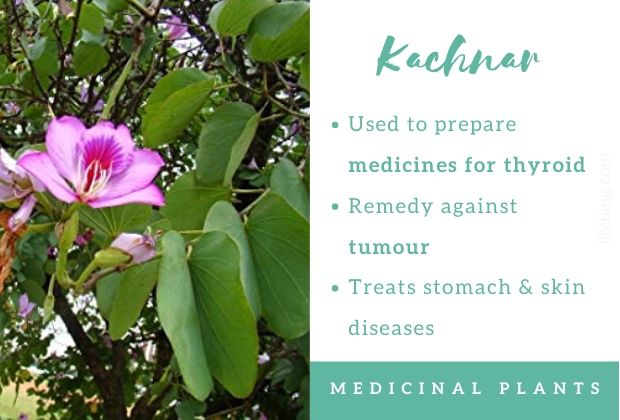
What are the medicinal benefits?
- Thyroid Cure: The medicine made from its leaves is used to treat thyroid disease.
- Tumour treatment: By consuming powder or syrup made from its plant, various types of tumours and related diseases.
Bhumi Amla
Bhumyamala is a short-height tropical herb widely found in coastal regions in India. It is also called ‘stonebreaker’ due to its use in the treatment of kidney stones. The plant grows up to a height of 28 inches. It has bark light green bark. Its fruits are tiny, smooth capsules containing seeds.

What are the medicinal benefits?
- Increases hunger: Taking the juice of amla helps to increase appetite.
- UTI Infections: Boil 1 teaspoon of bhumi amla powder and one teaspoon of turmeric powder in 1 cup of water. Taking this syrup for 5 days cures the urine/viral infection.
- Body Strength: With its intake, the immune system becomes strong and the body becomes energetic.
Datura (thorn apple)
Datura is a poisonous herb with fragrant white or light purple trumpet-like flowers and spiny round seed pods. It is popularly used as an indigenous cure in folklore or traditional systems of medicine in India.
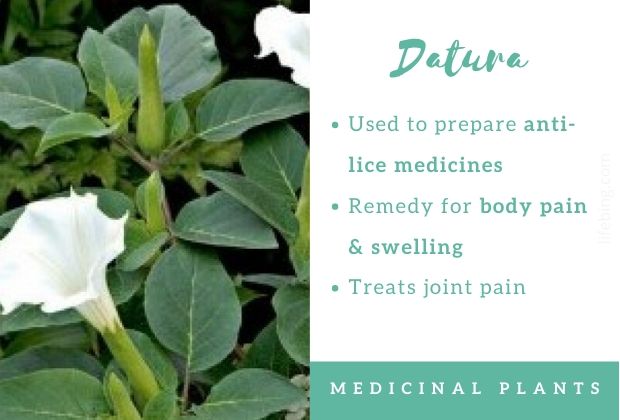
What are the medicinal benefits?
- Anti-Lice Remedy: A head-wash with the boiled water from the leaves of Dhatura naturally kills hair lice.
- Anti-inflammatory: Applying the paste or oil made from thorn-apple with lukewarm water gets relief from body pain and swelling problem.
- Joint Pain relief: Massaging the Dhatura plant with mustard oil on the swelling, relieves joint pain.
Apamarg (chaff-flower)
Chaff-flower or Apamarg is a tropical region herb that is used to treat several serious diseases. Due to its immense importance in traditional medicine, it is considered a boon for humans.
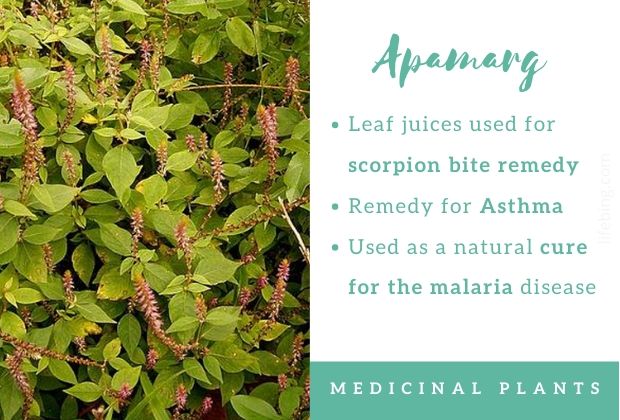
What are the medicinal benefits?
- Scorpion bite remedy: Consuming the juice of Apamarg leaves or rubbing the root on the scorpion bite provides relief.
- Thyroid natural remedy: People suffering from asthma, thyroid and obesity get benefit by eating powder of its leaves on an empty stomach in the morning.
- Malaria Cure: The tribals of Kenya use the chaff-flower plant as a cure for Malaria
- Eye Swelling: The herb is also used in inflammation of the eye.
Adusa (Malabar nut)
Adulsa herbal plant is full of medicinal properties. It is native to Asia and commonly known as Malabar nut. The magical plant is extensively used in South Indian traditional medicine, Ayurvedic, homeopathy and Unani systems of medicine.
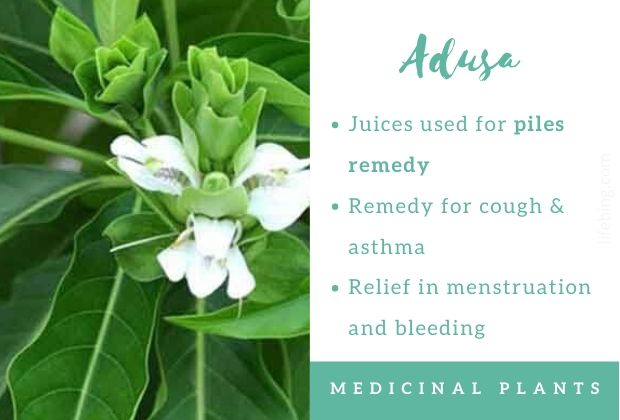
What are the medicinal benefits?
- Chest Infections: Consuming the juice of adulsa or its powder, prevents and, cures cough, asthma, asthma, piles.
- Menstruation: Provides relief from pain in the lower abdomen due to menstruation and bleeding.
The Takeaway
In summary, knowing about Ayurveda medicinal plants and their uses helps to take care for remedies in multitude of ailments. This will also allow you to follow a holistic approach to wellness that has been trusted for centuries.
I am a freelance writer. I love to blog about health and fitness issues.
